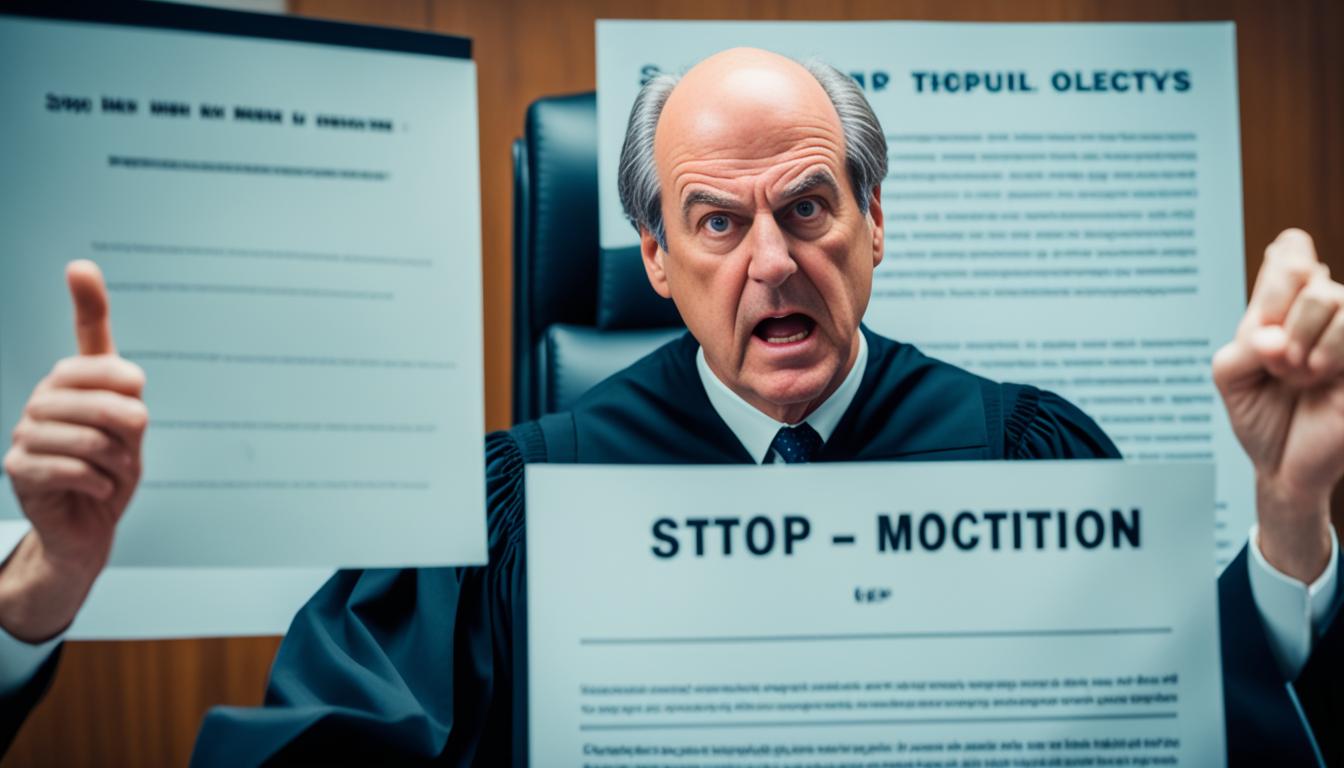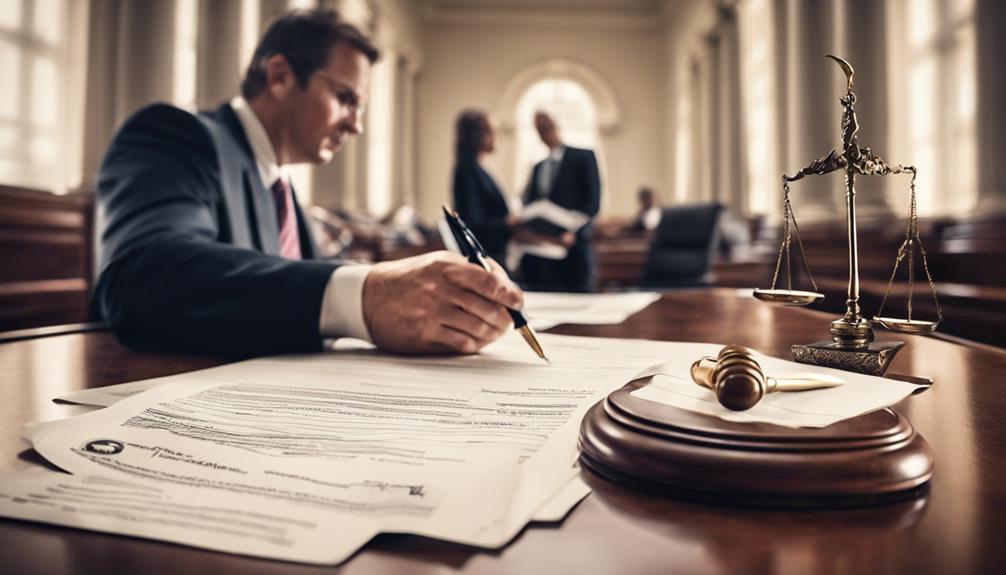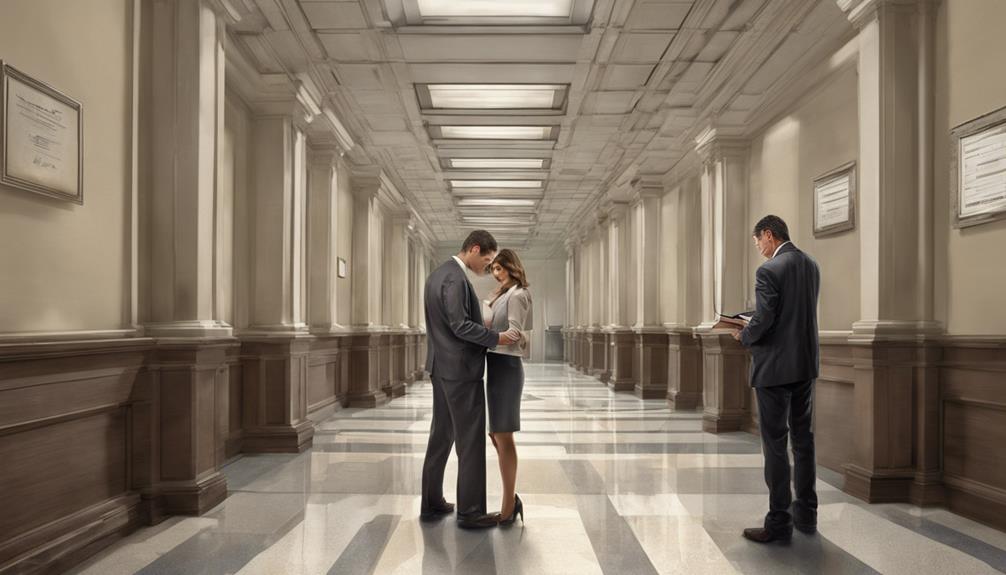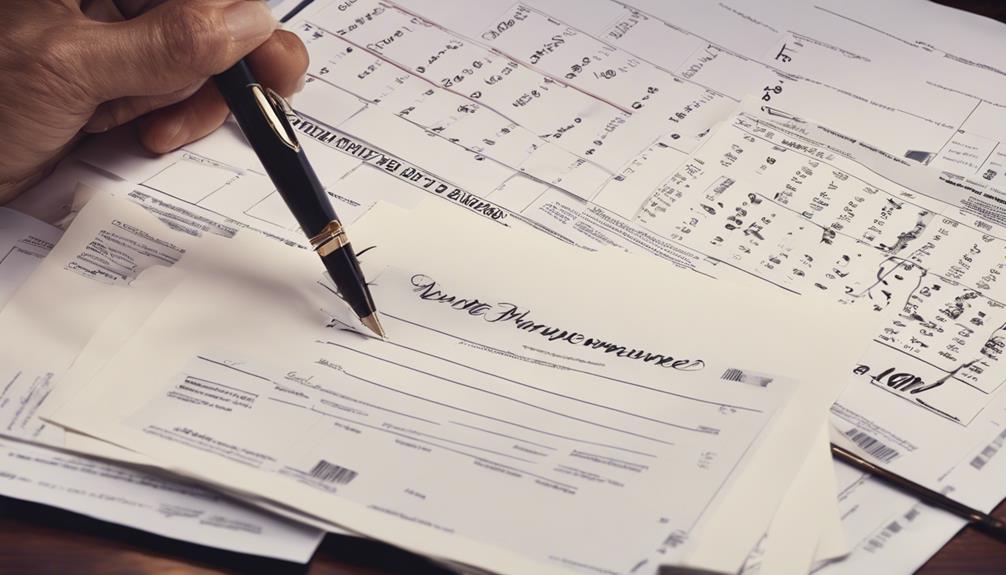Did you realize that objections in court can have a major impact on the outcome of a trial? From questioning the admissibility of evidence to blocking leading questions, objections are vital in guaranteeing a fair and impartial legal process. In this detailed guide, we will explore the various types of objections in court, their significance, and how lawyers can adequately prepare for them. Whether you are a budding attorney or just curious about the complexities of the courtroom, this article will offer you valuable insights into the realm of trial objections.
Key Takeaways:
- Objections in court are essential for maintaining the integrity of the judicial process.
- Common types of objections include relevance objections, leading question objections, and compound question objections.
- Other types of objections include argumentative objections, asked and answered objections, vague objections, speculation objections, hearsay objections, privilege objections, best evidence rule objections, and non-responsive objections.
- Attorneys should consider the strategic implications of making objections in court.
- Preparation is key to effectively addressing objections in court.
Types of Objections
Objections in court can take various forms. Some of the most common types of objections include relevance objections, objections to leading questions, and objections to compound questions.
Relevance Objection
A relevance objection challenges the admissibility of evidence that is not relevant to the case at hand. Attorneys may object to the introduction of evidence that does not directly support or relate to the issues being litigated. This objection serves to ensure that only pertinent and material information is presented in court, avoiding unnecessary distractions or misleading arguments.
Leading Question Objection
Attorneys may object to leading questions, which are questions intended to influence or suggest a particular answer to a witness. Leading questions often contain assumptions or biases that may manipulate the testimony, potentially undermining its credibility. By objecting to leading questions, attorneys seek to uphold the integrity of witness testimonies and prevent the distortion of facts.
Compound Question Objection
Compound questions are questions that include multiple parts or inquiries, making it challenging for a witness to answer accurately or clearly. Attorneys may object to compound questions to ensure that the interrogating attorney asks separate and distinct questions, allowing for precise and truthful responses. This objection aims to promote clarity and prevent confusion during the questioning process.
By understanding the different types of objections, attorneys can effectively navigate court proceedings, safeguard the fairness of the trial, and advocate for their clients’ rights.
Objection: Argumentative and Asked and Answered
During court proceedings, attorneys have the right to object to certain questions posed to witnesses. Two common objections that can be raised are the argumentative objection and the asked and answered objection.
An argumentative objection is made when a question is deemed argumentative in nature. In other words, the attorney is seeking to have the witness agree with an inference or conclusion put forth by the opposing party. The objection is raised to prevent the witness from being swayed or coerced into accepting a particular viewpoint.
On the other hand, an asked and answered objection can be made when a question has already been asked and sufficiently answered. This objection aims to prevent repetitive questioning and multiple responses that may confuse or influence the jury. When this objection is sustained, the attorney is not allowed to ask the same question again or seek further answers on the same issue.
Both the argumentative and asked and answered objections play crucial roles in maintaining fairness and clarity in court proceedings. They ensure that the questioning remains focused, limits attempts to manipulate the witness or jury, and prevents unnecessary repetition.
Attorneys must carefully consider if the questions posed are objectionable based on these grounds. By doing so, they can uphold the principles of justice and advocate effectively for their clients.
Example:
“Objection, Your Honor! The question is argumentative and seeks to have the witness agree with an inference not supported by the evidence.”
Guidelines – Argumentative Objection:
1. Analyze the question: Determine if the question is presenting an argument or attempting to influence the witness’s response.
2. Grounds for objection: Consider if the question seeks to have the witness agree with an inference or conclusion.
3. Objecting effectively: State “Objection, Your Honor! The question is argumentative and seeks to have the witness agree with an inference not supported by the evidence.”
Guidelines – Asked and Answered Objection:
1. Assess prior questioning: Determine if the same question has already been asked and sufficiently answered.
2. Prevent repetition: Object if the attorney is attempting to ask the same question again or elicit further answers on the same issue.
3. Make the objection: State “Objection, Your Honor! The question has already been asked and answered.”
| Objection | Definition |
|---|---|
| Argumentative Objection | An objection made when a question is deemed argumentative, seeking to have the witness agree with an inference or conclusion. |
| Asked and Answered Objection | An objection raised when a question has already been asked and sufficiently answered, preventing repetitive questioning and multiple responses. |
Objection: Vague and Speculation
During court proceedings, attorneys have the right to object to questions that are either vague or call for speculation. These objections serve to ensure that the witness is able to provide clear and accurate testimony based on their direct knowledge and understanding of the facts at hand.
A vague objection can be raised when a question lacks specificity and fails to provide the necessary details for the witness to provide a meaningful answer. This type of objection is aimed at preventing confusion and ambiguity in the courtroom, allowing for a more accurate presentation of the evidence.
For example, if a prosecutor were to ask a witness, “Did you see anything unusual?”, the defense attorney may object, citing that the question is too vague and does not specify what exactly constitutes “unusual”. This objection prompts the prosecutor to rephrase the question in a more precise manner that elicits specific information relevant to the case.
Similarly, attorneys can raise a speculation objection when a question calls for the witness to guess or speculate on an issue where they do not possess direct knowledge. This objection is crucial to maintaining the integrity of the testimony and preventing the introduction of unfounded opinions or assumptions.
For instance, if a defense attorney were to ask a witness, “Do you think the defendant intended to commit the crime?” and the witness has no factual basis to support their answer, the opposing attorney may object based on speculation. The objection would prompt the court to disallow the witness from providing a speculative opinion, limiting their testimony to facts they can directly attest to.
By objecting to vague questions and speculation, attorneys play a vital role in ensuring that the evidence presented is accurate, reliable, and based on firsthand knowledge. This helps to uphold the principles of justice and promote a fair trial for all parties involved.
If you want to visualize the impact of vague and speculative objections, take a look at the table below:
| Objection Type | Explanation |
|---|---|
| Vague Objection | An objection raised when a question lacks specificity and fails to provide clear details for the witness to respond accurately. |
| Speculation Objection | An objection raised when a question calls for the witness to guess or speculate on an issue they do not possess direct knowledge of. |
A Case Study: The Importance of Objecting to Vague and Speculative Questions
“In the high-profile trial of Smith vs. Johnson, defense attorney Julia Roberts successfully objected to multiple vague and speculative questions posed by the prosecution. By thwarting attempts to introduce unreliable and baseless claims, Roberts effectively established reasonable doubt and secured an acquittal for her client.”

As exemplified in this case study, objection to vague and speculative questions can significantly impact the outcome of a trial. Attorneys who strategically employ these objections help maintain the foundations of justice and safeguard their clients’ rights in the courtroom.
Objection: Hearsay and Privilege
In legal proceedings, objections can be raised on various grounds to ensure fair and just trials. Two common types of objections are the hearsay objection and the privilege objection.
The Hearsay Objection:
A hearsay objection is raised when evidence relies on secondhand information, often involving what a witness heard someone else say. Courts typically disallow hearsay evidence as it may lack reliability and can be prone to manipulation or misinterpretation. To be admissible, evidence must be based on firsthand knowledge or an exception to the hearsay rule must apply.
Attorneys raise hearsay objections to exclude testimony or documents that relay what someone else said, offering a weak basis for establishing the truth of the matter asserted. This objection helps maintain the integrity of the trial process by ensuring that only reliable and firsthand evidence is considered.
“Your Honor, I raise a hearsay objection to the witness’s statement about what someone told them. It falls under the classic definition of hearsay, as it is an out-of-court statement offered for the truth of the matter asserted.”
The Privilege Objection:
On the other hand, a privilege objection can be raised when a question seeks information protected by a legal privilege. Privileges are legal protections that prevent certain communications or information from being disclosed in court. The most common privilege is attorney-client privilege, which safeguards confidential communications between an attorney and their client.
Privilege objections are crucial in preserving the attorney-client relationship and encouraging open and honest communication. When a privilege objection is sustained, the information that would have been disclosed remains confidential, enhancing the trust between attorneys and clients.
“Objection, Your Honor. The defense’s question seeks information protected under attorney-client privilege. The information requested is confidential and falls under the privilege exception to disclosure.”
Understanding these objections is essential for attorneys to navigate court proceedings effectively and ensure the admissibility of evidence. By invoking the hearsay and privilege objections when necessary, attorneys can protect their clients’ rights and contribute to the pursuit of justice.
Objection: Violation of Best Evidence Rule and Non-Responsive
During court proceedings, attorneys may raise objections in response to questions or evidence that infringe upon specific legal standards. Two common objections that can be raised are the violation of best evidence rule and the non-responsive objection.
The best evidence rule objection comes into play when original documents or recordings are required as evidence, unless they are unavailable. This rule ensures that the most authentic and reliable version of a document or recording is presented in court. If the best evidence is not provided, an attorney can object, seeking to exclude or challenge the admissibility of the evidence in question.
On the other hand, the non-responsive objection is raised when a witness fails to directly answer the question asked and instead provides irrelevant information or goes off-topic. Attorneys use this objection to draw attention to the fact that the witness is not addressing the specific question at hand. By objecting, attorneys can prompt the judge to instruct the witness to provide a direct and relevant response.
Both the violation of best evidence rule objection and the non-responsive objection are tactical tools attorneys use to maintain the integrity of court proceedings and ensure that relevant and accurate information is presented. By objecting to violations of legal standards, attorneys help safeguard the fairness and accuracy of the trial.
Example of a Violation of Best Evidence Rule Objection:
In a case involving a contract dispute between two parties, Attorney A attempts to introduce a photocopy of the contract as evidence. Attorney B, recognizing the best evidence rule, objects to the admissibility of the photocopy and argues that the original contract should be presented instead.
Example of a Non-Responsive Objection:
Attorney C is questioning a witness about a specific event that occurred on a particular day. However, the witness veers off-topic and starts recounting irrelevant information. Attorney D swiftly objects, stating that the witness is being non-responsive and requesting that they answer the question directly.
By utilizing objections such as the violation of best evidence rule and the non-responsive objection, attorneys ensure that the trial stays focused on relevant and accurate information, contributing to a fair and just legal process.

Strategic Considerations for Making Objections
In addition to their essential role in court proceedings, attorneys must also consider the strategic implications when deciding to make objections. While objections serve to protect the rights of the parties involved and ensure the integrity of the trial, it’s important to carefully assess the impact of objectionable questions or answers on the overall case before raising objections.
Timing plays a crucial role in determining when to object in court. Attorneys must balance the need to address objectionable content and avoid allowing harmful information to go unchallenged while considering the jury’s perception. Constant and unnecessary objections can create a negative impression and disrupt the flow of proceedings, potentially alienating the jury.
Strategic considerations for making objections include evaluating the potential impact of objectionable content on the case’s themes, key arguments, or witness credibility. Attorneys need to determine whether objecting to a particular question or answer aligns with the overall trial strategy and supports their client’s position.
Objecting to every question or answer may not always be the most effective approach. Attorneys should carefully choose which objections to raise, focusing on those that have significant legal merit or that undermine the opposing party’s case. By prioritizing objections strategically, attorneys can maximize their impact and maintain credibility with the judge and jury.
“Strategic objections are like chess moves, aimed at positioning oneself advantageously in the legal battlefield.”
Attorneys can anticipate potential objectionable content through thorough case preparation. By identifying critical areas of vulnerability or anticipated challenges, they can develop objection strategies in advance. This preparation can include creating a list of objectionable issues, studying relevant case law, and consulting with their legal team to ensure a cohesive and effective objection strategy.
Coordinating objections with witnesses can also play a significant role in maximizing their impact. Attorneys can work with witnesses to educate them about potential objections that may arise during their testimony, allowing them to answer confidently and anticipate potential challenges.
Strategically timed objections can also be used to disrupt opposing counsel’s flow, redirect a line of questioning, or create doubt in the minds of the jury. By strategically objecting, attorneys can indirectly influence the jury’s perception of the evidence, witness credibility, or overall case narrative.
Ultimately, the strategic considerations for making objections require a comprehensive understanding of the case, meticulous preparation, and an ability to adapt to evolving circumstances during the trial. By carefully weighing the potential benefits and risks of objections, attorneys can effectively advocate for their clients while maintaining the respect and attention of the court.

| Benefits of Strategic Objections | Risks of Unnecessary Objections |
|---|---|
|
|
Preparation for Objections in Court
When it comes to courtroom proceedings, preparation is key. While it may be impossible to predict every objection that could arise during a trial, attorneys can still take proactive steps to strengthen their case and address potential objections. By familiarizing themselves with the specific issues surrounding their case, understanding the expected testimony of their witnesses, and recognizing the types of objections that commonly occur, attorneys can navigate objections with confidence.
One effective way to prepare for objections in court is to thoroughly examine the issues and evidence involved in the case. Attorneys should conduct a detailed analysis of all relevant facts, laws, and precedents. This thorough understanding of the case will allow attorneys to anticipate possible objections and respond effectively.
It is equally important for attorneys to be well-versed in the expected testimony of their witnesses. By conducting mock examinations, attorneys can identify potential areas where objections may arise and refine their questioning techniques accordingly. This preparation will help attorneys ask precise and focused questions, reducing the chances of objections being sustained.

Streamlining administrative aspects of the case can also contribute to effective preparation for objections. Utilizing legal practice management software can help attorneys organize and manage case-related documents, deadlines, and communications. By automating tasks and reducing administrative burdens, attorneys can focus more on trial preparation and developing strategies to handle objections.
In summary, adequately preparing for objections in court requires a comprehensive understanding of the case, diligent examination of the issues and evidence, and familiarity with the expected testimony of witnesses. By implementing efficient case management practices and investing time in strategic preparation, attorneys can enhance their ability to navigate objections and present a strong and persuasive case.
Conclusion
Objections in court are paramount for guaranteeing a fair trial and upholding the principles of justice. Understanding the different types of objections and their implications empowers attorneys to adeptly navigate court proceedings and strongly advocate for their clients’ rights.
“The courtroom is where the battle for justice takes place, objections serve as the shields and swords that ensure a level playing field for all parties involved. They safeguard the rights of individuals and maintain the integrity of the legal system.”
In court, objections are not mere formalities; they play a crucial role in ensuring that evidence presented and testimony provided aligns with the rules of legal admissibility. By raising objections, attorneys can challenge the validity, relevance, or legitimacy of information, thereby safeguarding their clients’ interests and the overall integrity of the proceedings.
Throughout this article, we have explored various types of objections, such as relevance objections, leading question objections, compound question objections, argumentative objections, asked and answered objections, vague objections, speculation objections, hearsay objections, privilege objections, violations of the best evidence rule, and non-responsive objections. Familiarity with these objections empowers attorneys to anticipate potential issues, effectively present their case, and protect their clients’ rights.
Moreover, strategic considerations also come into play when making objections. Attorneys must strike a balance between protecting their clients and being mindful of the perceived impact of frequent objections. Identifying objectionable questions or answers that genuinely affect the case’s outcome and understanding how objections may be perceived by the jury is crucial in making informed decisions during the trial.
Preparing for objections is equally vital. While it is impossible to predict every possible objection, attorneys can diligently prepare for court proceedings by thoroughly understanding their case, reviewing witness testimonies, and familiarizing themselves with common objections that may arise. Employing legal practice management software can streamline administrative tasks, allowing attorneys to spend more time focusing on trial preparation and potential objections.
Ultimately, objections are not mere technicalities; they are powerful tools that shape the course of legal proceedings. By effectively navigating objections, attorneys can secure a fair trial for their clients, while upholding the values and principles of justice.
Stay Vigilant, Ensure Fairness
As you continue your journey in the legal profession, keep in mind the relevance and importance of objections in court. By honing your knowledge of objections, attending legal seminars, collaborating with experienced colleagues, and maintaining an unwavering commitment to justice, you can be an unwavering advocate for your clients and contribute to a fair and just legal system.

| Benefits of Objections in Court | Key Takeaways |
|---|---|
|
|
Additional Resources
For further assistance in understanding objections in court, attorneys can refer to a wide range of additional resources available. These resources can provide valuable insights, explanations, and practical tips to enhance legal knowledge and skills in handling objections effectively.
- Books: Numerous books delve into the intricacies of objections in court, offering comprehensive coverage of the topic. “Mastering the Art of Objection Handling” by John Smith is a highly recommended read for attorneys looking to strengthen their objection strategies.
- Legal Blogs: Many legal professionals and experts share their knowledge and experiences through informative blogs. Websites like “Legal Insights” feature articles and case studies exploring various aspects of objections in court, offering practical advice for attorneys.
- Bar Association Resources: Local and national bar associations often provide valuable resources for legal professionals. These resources may include guides, articles, and seminars specifically focused on objections in court.
- Continuing Legal Education (CLE) Programs: Attorneys can attend CLE programs that offer specialized training on objections in court. These programs are designed to provide up-to-date information and practical skills to effectively handle objections during trial proceedings.
- **Practice Management Software**: Technology can play a significant role in streamlining case management and preparation. By utilizing practice management software specifically tailored for litigators, attorneys can efficiently organize case materials and focus on objection strategies.
By utilizing these additional resources, attorneys can deepen their understanding of objections in court and stay updated on best practices. This knowledge can ultimately enhance their ability to navigate objections and present compelling arguments, ensuring a fair and just trial process for their clients.

About the Authors
Meet the authors behind this comprehensive guide on understanding objections in court. Combined, they possess extensive experience and knowledge in the legal field, making them well-equipped to provide valuable insights and explanations.
Author A: With over 15 years of practice as a trial attorney, Author A specializes in civil litigation and has successfully represented clients in high-profile cases. Their expertise in objections and courtroom strategies has been honed through years of courtroom experience and a deep understanding of legal principles.
Author B: As a former prosecutor and now a defense attorney, Author B has a unique perspective on objections in court. Their practical experience in criminal trials has given them a profound understanding of objectionable issues and effective techniques for preserving their clients’ rights.
Author C: Drawing from their experience as a law professor and appellate attorney, Author C brings a scholarly approach to objections in court. Their in-depth knowledge of legal precedents and persuasive arguments adds a valuable academic dimension to the discussion of objections and their significance in the legal landscape.
Expertise and Credentials
Collectively, the authors have earned recognition and accolades for their contributions to the legal profession. They hold Juris Doctor (J.D.) degrees from respected law schools and have been admitted to practice law in multiple jurisdictions. Their diverse backgrounds, which include litigation, criminal law, and academia, ensure a well-rounded and comprehensive understanding of objections in court.
The authors have also published numerous articles and presented at legal conferences, sharing their insights with fellow legal professionals. Their commitment to promoting fair and effective courtroom practices is evident in their meticulous research and dedication to providing accurate and up-to-date information.
As active members of their respective legal communities, the authors continue to stay informed about emerging trends and legal developments. Their collective expertise forms the foundation of this article, ensuring that readers gain a deep understanding of objections in court and their critical role in the pursuit of justice.

References
References are an integral part of the compilation of this article, providing reliable and authoritative sources of information. The following sources were consulted to ensure the accuracy and validity of the content:
- Cornell Law School – A leading resource for legal research and information, offering an extensive database of court cases, statutes, and legal publications.
- American Bar Association – The largest voluntary association of lawyers and legal professionals, providing valuable insights and resources on various legal topics.
- Supreme Court of the United States – The highest court in the country, offering access to landmark decisions and legal opinions that shape the practice of law.
- Law.com – A comprehensive legal news and information platform that covers a wide range of legal topics, including court procedures and objections.
These references have been instrumental in creating a well-rounded and informative article about objections in court. By drawing from reputable sources, we aim to provide readers with accurate and up-to-date information for a better understanding of this crucial aspect of the legal system.










